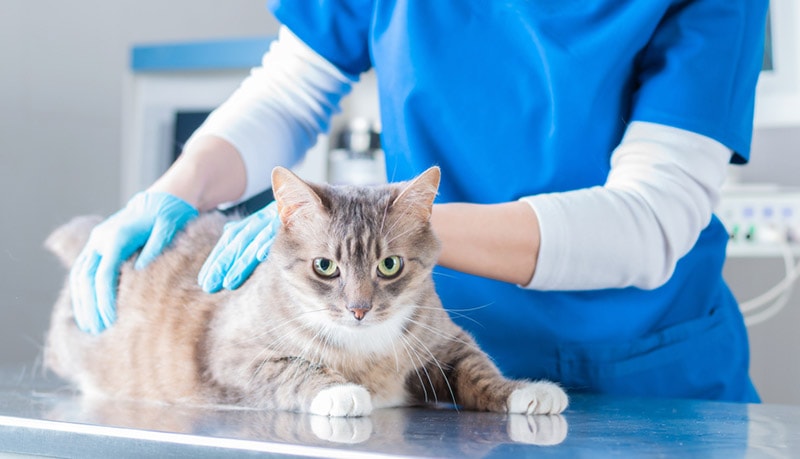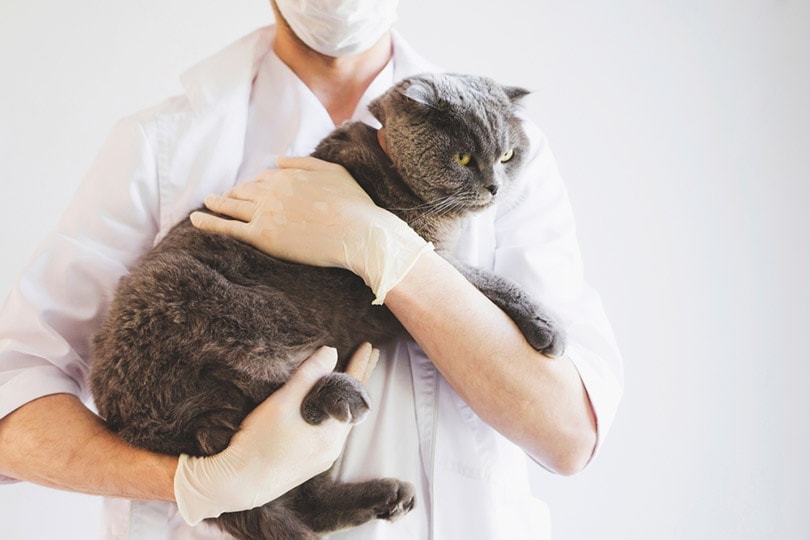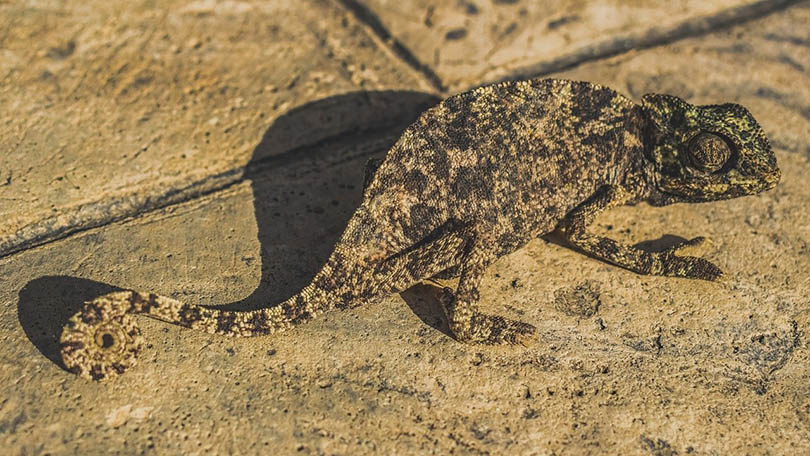VET APPROVED

The information is current and up-to-date in accordance with the latest veterinarian research.
Learn more »Click to Skip Ahead
Feline Leukemia Day is observed on July 15th to raise awareness about the feline leukemia virus, a serious viral infection that is fatal to cats. While there is a vaccine to prevent this illness, many cats are not vaccinated against it and end up becoming ill. Sadly, this disease isn’t curable, and all cats die from it after a few years.
Many cat owners do now know about feline leukemia despite how prevalent it is. Therefore, this observance is extremely important to help spread awareness of this condition.

What Is Feline Leukemia?
FeLV is a retrovirus that attacks the cat’s immune system. It is spread through saliva, blood, and other bodily fluids. Cats can become infected with FeLV through bites, scratches, shared food and water bowls, and litter boxes.
Most cats show signs of this illness after 3 or so years. However, others may go years without showing any signs. Some common signs include weight loss, fever, anemia, eye problems, swollen lymph nodes, and recurrent respiratory infections. However, kittens and cats with weak immune systems can develop signs of the disease weeks or months after initial infection.
Call a veterinarian if you suspect your cat has feline leukemia.
Some treatments can help cats that are affected by feline leukemia. For instance, medication can be utilized to boost their immune system, and supportive care can prevent illnesses. While these cats usually have a shorter lifespan than uninfected felines, they can still live happy lives.
How to Celebrate Feline Leukemia Day
If your cat is not vaccinated against FeLV, now is the time to make an appointment! Not only does getting your cat vaccinated help prevent them from getting sick, but it also helps stop the spread of the illness. If your cat can’t get sick, then they can’t transmit it to other cats. Therefore, vaccinating your cat can protect them and other felines who cannot get vaccinated, either because they are immunocompromised, too young, or feral.
You can also donate to a charity that supports cats with FeLV. Sadly, cats with this illness are often overlooked at animal shelters and adoption agencies. After all, very few people are willing to look after a cat that is sick (and will be sick for the rest of its life). Therefore, there are many agencies out there that seek to help and support cats with this condition.
Consider spreading awareness on social media, as well. FeLV is completely preventable with the correct vaccinations. However, many cat owners don’t understand the severity of this illness or know it can be prevented by a vaccination.
If you have the resources, consider adopting a cat with FeLV. All cats deserve a loving home, and those with this condition do particularly poorly at shelters.
Is Feline Leukemia Always Fatal?
Yes, feline leukemia is always fatal. The median survival time for cats after FeLV is diagnosed is 2.5 years. However, some cats may live with the disease for longer. Kittens typically die within a year of being diagnosed. This difference is because a kitten’s immune system isn’t fully developed, so they are more prone to the effects of the virus.
Either way, cats that are diagnosed with FeLV almost always have a shorter lifespan than uninfected cats. Still, some cats that are infected but without showing signs do go on to live their full lifespans. We don’t know why some cats show signs quickly, and other cats remain asymptomatic.
Care also plays a huge role in their lifespan. Cats that are kept in a home and not exposed to many viruses from other cats tend not to get sick very much and, therefore, live longer. Those who are feral or in unclean living conditions may be more likely to catch other illnesses, which can be fatal, thanks to their impaired immune system.
With proper care, some cats with FeLV can live happy and fulfilling lives. They can still enjoy playing, eating, and spending time with their loved ones. Euthanizing the cat is typically not required unless the virus becomes more severe, which can take several years. However, it is recommended to keep these cats away from other felines.


Final Thoughts
Despite its prevalence and severity, Feline Leukemia is still not widely understood or known. On Feline Leukemia Day, it’s important to spread awareness about this condition so that more cat owners can get their felines vaccinated and prevent the spread of this disease.
If you haven’t gotten your cat vaccinated, it’s vital that you make an appointment with your vet. Most vets recommend testing unvaccinated cats for FeLV, as well. It can take several years for signs to develop, but early treatment is important.
- https://americanpetsalive.org/uploads/resources/FeLV-FAQ_2021-09-13-135357_nqib.pdf
- https://www.spcamhc.org/resources/cats/faqs-about-feline-leukemia-virus-felv
- https://www.vet.cornell.edu/departments-centers-and-institutes/cornell-feline-health-center/health-information/feline-health-topics/feline-leukemia-virus
Featured Image Credit: Alice Rodnova, Shutterstock












